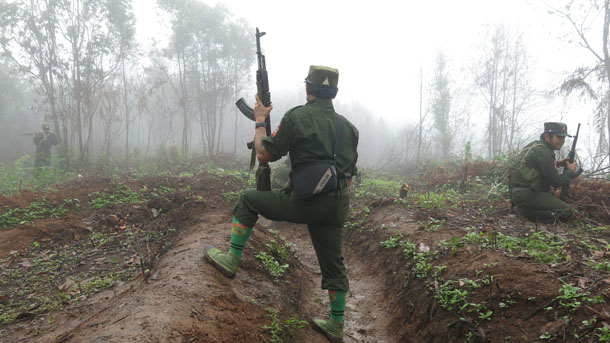RANGOON — The Shan State Army-North (SSA-North) said it has lost two bases in Kehsi Township in northern Shan State in recent days following attacks by the Burmese military.
The confrontation is the latest in a string of armed of clashes that have broken out between the two sides in the past year despite a ceasefire agreement.
“We lost one base at Wanwap village and another one at Ta San Puu village,” SSA-North spokesman Sai La said by phone, adding that the military’s Light Infantry Battalions No. 525 and No. 569 had attacked the bases on June 22-23.
He said that the Shan rebels had controlled the base at Wanwap village in Kehsi Township, south of Lashio, for decades. “This is the first time that government troops attacked this base,” he added.
Sai La said regional military commanders had contacted the rebels during the fighting to let them know that they should give up the base at Wanwap village in order to avoid full-scale attack.
“We withdrew our troops from our base at night on June 23,” he said, adding that Tatmadaw units later “continued to stay at our Buddhist temple nearby, where we used to have a temporary base.”
Asked why the Burmese army would want to capture the SSA-North base at Wanwap village, he said, “If they can control this base they can block [SSA-North] troop movements.”
Sai La said the other captured SSA-North base had been located at Ta San Puu village, where ferries crossing the local river dock.
The SSA-North reached a ceasefire with the government in 1989, but the deal broke down in March 2011 when the government army launched a military offensive against the Shan rebels, displacing more than 30,000 civilians.
The government signed a new ceasefire deal with the SSA-North in January last year, and the two sides have since met several times for peace talks.
The agreement has however, failed stabilize the situation in northern Shan State and dozens of armed clashes have been reported since the signing of the ceasefire, displacing thousands of local villagers.
Government forces have also engaged in ongoing clashes in the region with the Kachin Independence Army (KIA) and the Taaung National Liberation Army (TNLA), which maintain units in parts of northern Shan State.
Despite frequent reports of ongoing clashes in Shan and Kachin states, Naypyidaw has proclaimed its peace process a success. The government reached ceasefires with 10 out of Burma’s 11 main ethnic militias in the past year, earning it plaudits from the international community, which is keen to embrace President Thein Sein’s reformist government.
Some observers doubt however, that the agreements will bring lasting peace, as Naypyidaw has made no attempt to meet the ethnic groups’ long-standing demands for greater political autonomy through the creation of federal states in Burma.

















